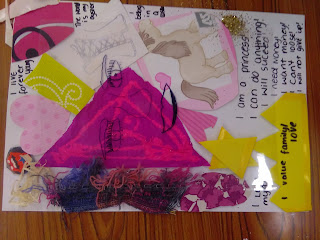- Get link
- X
- Other Apps
- Get link
- X
- Other Apps
Aim:
To make a self portrait using clear sheets and paperLink to slide show:
https://goo.gl/photos/cKK63iMa8RLG7ik77
Learning objectives:
- To use 'I' statements to explore thinking and beliefs
- To explore identity and self
Materials:
Clear plastic sheetsSharpie pens
Selection of different papers and materials to go behind the plastic for example old wallpaper display books
Finish the sentences.
I am...
I can...
I will...
I need..
I want...
I can't...
I will not...
I love....
I live...
The World is....
I belong...
I value...
http://panicdisorder.about.com/od/livingwithpd/a/Cognitive-Restructuring.htm
The most common faulty thinking patterns include all-or-nothing thinking, should statements, blame, and labeling. Listed below is a brief summary of these typical cognitive distortions:
All-or-Nothing Thinking – This distortion involves only seeing the extremes, without noticing any gray areas in between. Life is either good or bad. A person is either a total success or a complete failure. People with panic disorder often see themselves as overly nervous or frazzled, without accounting for all the times they remain cool, calm, and collected.
Should Statements - When going along with this cognitive distortion, the person will use self-statements that involve the terms “should,” “ought,” or “must.” A panic disorder sufferer may think to himself, “I must control my panic attacks or others will think less of me,” I ought to be able to get over my anxiety already,” or “I should be able to overcome my fears without any help.” Such negative self-statements can lead to a lowered sense of self-esteem and unhappiness.
Blame – Far too many people with panic disorder blame themselves for their condition. For example, a person may think to themselves, “My panic symptoms are all my fault.” Blaming others can also be a negative thinking pattern in which the person begins to believe that others are the source of their problems or responsible for their anxiety.
Labeling - This common cognitive distortion often entails negative statements about oneself. A person with panic disorder may label himself as “crazy” or “neurotic,” which can make him feel pretty hopeless about his condition.
=
Location: Ireland
Ireland
- Get link
- X
- Other Apps























































